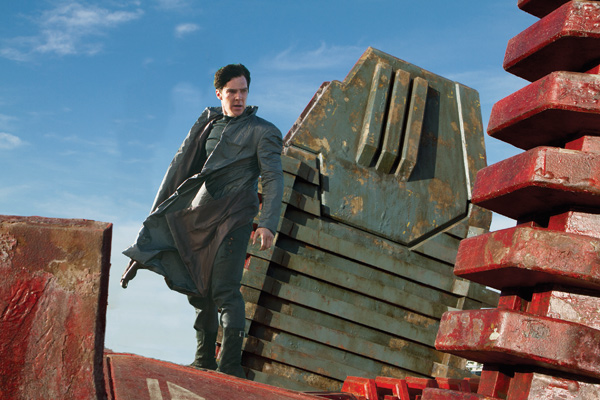P.D. James is a figure of fun in my household. She used to be a regular pundit on Newsnight Review, the old BBC arts programme, and her film criticism was guided by her hearing. Every new film, she complained, was ‘terribly loud’. Why didn’t projectionists reduce the volume? We wondered if it had ever been thus with James. We replaced the baroness’s soft tones with the austere squawk of Dame Edith Evans and declared that Buster Keaton was ‘terribly loud’.
But the great lady is on to something: an overbearing sound system can harm a film. Star Trek Into Darkness began and it was as if a choir of Hell’s Angels, on their way to the seaside to biff some unsuspecting day-trippers, had taken a detour via the Leicester Square Empire. I reached immediately for the nonexistent remote.
The second film in this Star Trek franchise is a blockbuster aimed at families with teenage children. The script is as witty as the special effects are dramatic. It’s probably even wittier than that; but I couldn’t say for sure because I lost some of the dialogue to the background cacophony.
The supporting players get the best lines, as is meet and right. Karl Urban pitches Bones (the Starship Enterprise’s doctor) somewhere between Jack Benny and Jack Klugman as Quincy, while Simon Pegg is often hysterical as chief engineer Scotty (think Frankie Howerd with a dodgy Scottish accent).
Those two characters embody director J.J. Abrams’s success in creating a film that honours Star Trek’s place in popular culture while managing to have a sense of humour about itself. The exasperated Scotty does not (at least to my ears) shout, ‘She cannot take any more, Captain!’ because that would be too obvious. Instead, he derides Captain James Tiberius Kirk as ‘James Tiberius Perfect Hair’, which is novel.
The lead roles have been given an extra dimension or two since their first outing. There are three character-driven subplots to supplement the ripping yarn at the film’s heart (about which I shall say nothing for fear of being beamed somewhere nasty). Captain Kirk (Chris Pine) and Commander Spock (Zachary Quinto) veer between affection and animosity, exchanging barbs and bonhomie in equal measure. Pine and Quinto have developed a strange and compelling chemistry that promises to intensify in the final film of the trilogy.
Spock’s love affair with his shipmate Nyota Uhura (Zoe Saldana) is sufficiently troubled to be interesting. And the flirtation between Kirk and Dr Marcus (Alice Eve) suggests that there will be more amours on the bridge next time round. Although surely Dr Marcus is too sensible to get mixed up with Kirk the coiffured gigolo? Then again, everyone loves a hero. Questions, questions. The characterisation is hardly Proustian; but it gives the film some depth and breaks up the breathless action sequences that are Abrams’s signature.
Kirk and his crew on the Starship Enterprise have to contend with Benedict Cumberbatch, who is brilliant as the villain. Cumberbatch follows the Richard Burton School of Acting in Trash and approaches the film as if it were serious. He delivers even the most cartoonish lines as if Christopher Marlowe had written them. He is helped by the computers that have modified his voice from an upper-class rasp into a brandified boom. The result is captivating.
Cumberbatch may look geeky and sound awkward in real life; but my does he steal the limelight. His baddie is a demonic über-warrior, a genetically modified hulk of testosterone and savagery. The part is so different from Christopher Tietjens, the noble innocent he played in the recent adaptation of Parade’s End, and from Sherlock Holmes, that Cumberbatch can stop worrying about being typecast as ‘slightly asexual, sociopathic intellectuals’. Seething psychopaths may be his problem after this.
Cumberbatch is so good that he exposes the film’s weaknesses, most of which are directorial. The opening scene is spectacular but difficult to follow. A subtitle at the start of the sequence would have saved five minutes of turgid explanatory dialogue after the event. The present cut means that nearly 15 minutes have elapsed before the film gets under way. The plot is not straightforward and too many of its intricacies are rushed or left unexplained, while Abrams cannot resist indulging in extraneous detail and gratuity. No sooner has Alice Eve been introduced than she strips down to her bra and knickers. My hypothetical 13-year-old son would be delighted by this lingerie advert; but a family outing does not usually involve titillation. This is Star Trek, not Belle de Jour.
These are, however, minor gripes. I am not a Trekkie, yet I enjoyed this film. But I agree with the vagrant I passed when leaving the screening, who bellowed: ‘What a noise!’ The closing credits were audible from the street.






Comments